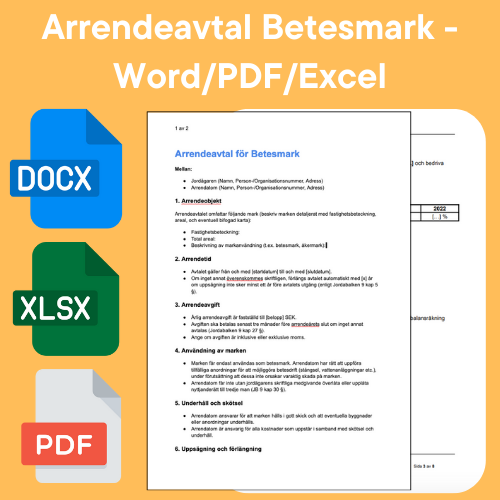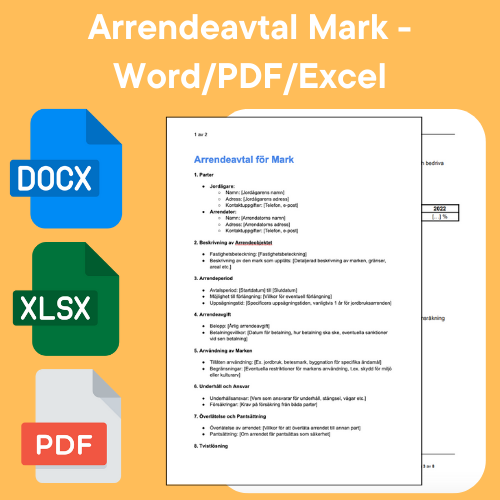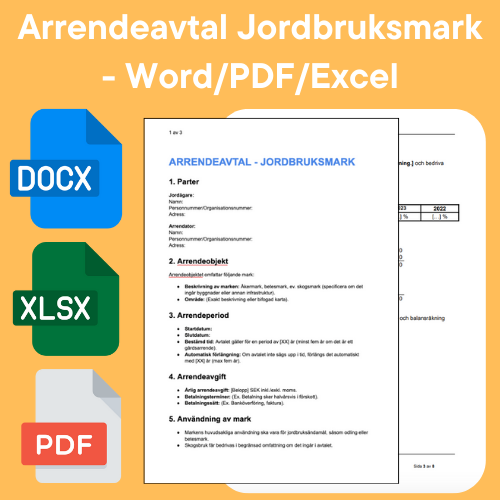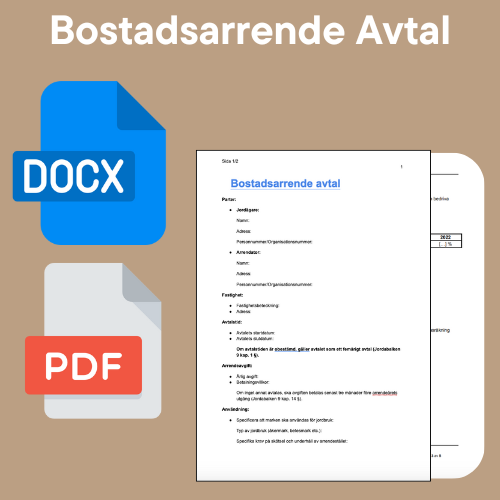Security of Tenancy: An In-Depth Guide
Share
Protection of possession in case of Lease
What is Possession Protection?
Security of tenure is a legal right that protects tenants against involuntary termination of the lease. This means that the lessee has the right to continue using the land or property under certain conditions, even if the landowner wants to terminate the agreement. In this article, we will go through what security of tenure means, how it works according to Swedish law, common mistakes and examples of legal disputes related to security of tenure when leasing.
Types of Lease and Security of Tenure
Agricultural lease
The lessee has strong possession protection. According to Jordabalken (JB) chapter 10, the lessee has the right to an extension of the lease unless there are special circumstances.
Residential lease
A strong protection of possession also applies here. The lessee has the right to build or maintain a residential building on the land and has the right to contract extension according to JB chapter 10.
Facility lease
Indirect tenure protection applies, which means that the lessee can receive financial compensation upon termination instead of the right to an extension.
Apartment lease
Lacks protection of tenure, which means that the agreement can end without the right of extension for the lessee.
When Does Possession Protection End?
There are several situations where the protection of possession can be broken:
- Forfeited tenancy: If the tenant does not behave, for example by not paying the fee or neglecting the land, the landowner can terminate the agreement.
- Impaired security: If the security provided by the lessee deteriorates and is not replaced, the tenure protection may cease.
- Personal reasons on the part of the landowner: If the landowner himself or his immediate family needs the land and it is not unfair to the lessee, the tenure protection can be broken.
Common Mistakes
Two common mistakes that renters often make are:
- Inadequate Documentation: Not having a written lease can lead to confusion and disputes. It is important that all conditions and changes are carefully documented.
- Misunderstanding of Notice Periods: Many tenants fail to terminate the agreement in time, which can lead to automatic renewal on unchanged terms.
Legal Disputes
Some examples of legal disputes related to security of tenure:
- Dispute over Extension: In one case, the tenancy board judged that the lessee had the right to an extension despite the landowner's application for termination. The landowner did not have sufficient reasons to break the security of tenure.
- Increase in Lease Fee: Another common dispute concerns an increase in the lease fee. A landowner tried to raise the fee from SEK 5,000 to SEK 12,000 per year, which was considered unreasonable and was rejected by the lease committee.
Legal Information and Legislation
Tenure protection is regulated in the Land Code (JB), chapters 10-11. These chapters describe the basic rights and obligations of both tenants and landowners. The security of tenure is designed to protect tenants' investments and ensure that they do not lose their right of use without good reason.
Termination procedure
In order to terminate a lease agreement, it is required that the landowner refer the matter to the lease board within a certain time. If this is not done correctly, the termination may be voided and the contract automatically extended.
Possession Breaking Grounds
According to JB chapter 10, the protection of tenure can be broken if the leasehold is forfeited, if security is impaired, or if the landowner or his next of kin needs the land.
Summary
Tenure security is an important right that protects tenants from involuntary termination. There are different types of leases, each with their own rules and forms of security of tenure. Agricultural and residential leases have strong protection of possession, while construction leases have indirect protection of possession. It is important that both tenants and landowners are aware of their rights and obligations to avoid legal disputes and misunderstandings.




